Washington DC 20, July 2010
‘Building Kosovo’s Euro-Atlantic future: The Opportunities and the Challenges Ahead’
Dear participants;
Ladies and Gentlemen;
I will start my presentation by initially thanking the United State Institute of Peace, and particularly Mr. Daniel Server for the opportunity to address to this esteemed audience.
The future of Kosovo and other Western Balkan countries is and should be NATO and EU memberiship.
This aspiration is not only a desire but a necessity for long-term peace and stability.
Eleven years passed in freedom and more than two year since the time when in coordination with the international community we declared Kosovo as an independent and sovereign state.
Kosovo until now has been recognized by 69 states around the world, is member of the International Monetary Fund (IMF), World Bank (WB), and we are close to gaining membership in the European Bank for Reconstruction and Development (EBRD).
Unfortunately there are still countries that behave with Kosovo as if it does not exist.
However our message is clear: Kosovo exists and it is a functioning state – it existed yesterday, today, tomorrow and forever.
As the United States and American people are proud of values they represent, similarly Kosovo citizens are also proud – we are proud of our heritage and multiethnicity, proud of our history and full of hope for the future.
Kosovo will be an example of tolerance and multiethnic society for the entire Europe.
Ladies and Gentlemen:
In the course of these few years that we are living and working in freedom, Kosovo has made considerable progress in many areas having in mind the limited opportunities and complex political situation.
In the sphere of economy, Kosovo has inherited a weak economy as a result of management of the past system and damage caused during the war.
Nevertheless, in recent years we have been working hard to maintain a solid economic growth despite serious global financial crisis.
We are reducing Government’s participation in the economy to stimulate private sector.
This is why we are privatizing major state assets: Kosovo Energy Corporation (KEK) and the Post and Telecommunications of Kosovo (PTK).
Months ago we have successfully completed a concession award of the Prishtina International Airport to a prestigious company for the next 20 years.
In order to stimulate foreign investments, we have decided to commence with the construction of the first highway in Kosovo, which links my country with Albania and Serbia.
The winning company, an American-Turkish Consortium Bechtel &Enka, has already commenced operations, whereas the project is expected to be finalised within a period of three years.
Only with the project of construction of the highway, we are ensuring the opening of approximately 4000 new jobs.
Ladies and Gentlemen:
One of the most challenging areas for Kosovo was and still remains the Rule of Law.
This is not only due to the fact that in the northern part of Kosovo illegal security structures which are being financed by Serbia are still operating, but also due to the fact that results in the fight against organised crime and corruption are still not satisfactory.
In order to overcome this situation, we are working closely with the EULEX and other international mechanisms in Kosovo.
We, respectively institutions of Kosovo will continue to be at the forefront of the fight against corruption, organized crime and other negative phenomena.
This battle is giving its initial results after 11 years of ‘tolerated’ silence.
This is not an easy battle, but I have assured my fellow citizens that we will not be compromising; I can also assure our friends in Washington that we will be successful in this endeavour.
We are building a functional state based on the rule of law and this is the only alternative ahead.
For this purpose, we have started a thorough reform of judicial system, and most of the new pieces of legislation regulating this area are under adoption procedures in the Assembly of Kosovo. These pieces of legislation have and are being drafted in line with the highest international standards.
These reforms will enable creation of a modern, effective, and independent judicial system.
Justice is and should be available equally to all citizens.
Ladies and gentelmen;
I want to reiterate that Kosovo is a multiethnic state and I feel proud that our Constitution and laws affirm the rights of all communities living in Kosovo in affirmative manner.
I am pleased to say that over 90% of provisions arising from the Comprehensive Plan of President Ahtisari which mainly deal with minority community rights have already been implemented.
Decentralization is taking root throughout our country, as the Government is transferring responsibilities to local structures and bringing Government closer to the people.
Last autumn we surprised the world with the success of our local elections and the overwhelming turnout of our Serbian citizens, who chose to embrace decentralization and who took advantage of the chance to take responsibility for local government.
We held free and democratic local elections and Kosovo Serbian citizens participated and elected their local representatives.
Last Sunday, citizens of Partesh municipality – a Serbian majority municipality being established in accordance with Comprehensive Status Settlement of president Ahtisari plan, voted massively (turnout over 60%) and elected their new mayor and their new local leaders.
Out of five new Serbian majority municipalities as foreseen by Comprehensive Status Settlement of President Ahtisari plan, four of them have already been established and are functional.
We are now working to establish the fifth municipality of the Mitrovica north and we have established the Municipal Preparation Team for this purpose to prepare the ground for free and fair elections.
Recently, in coordination with International Civilian Office (ICO) and other international structures we opened an Office for Civil Services of the Republic of Kosovo in the North of river Iber which serves to the needs of all citizens living in that area.
Unfortunately, full integration of the Serbs living in the North of river Iber is hindered due to the destructive role of Serbia.
However, we will not step back because we know that Serbian citizens living in this part of the country want to assume their responsibilities and live in the same way as the other Serbs living in the South of the river Iber.
You all know that Kosovo Serbs have the right of dual citizenship – that of Kosovo and Serbia.
However, it is encouraging that until now around 20.000 (twenty-thousand) Serbian citizens have obtained their identification cards of the Republic of Kosovo. This is another strong argument of their desire to have themselves being integrated in Kosovo institutions.
Dear participants;
As you well know and I believe you all agree with the conclusion that the creation of the Kosovo state has brought stability and new opportunities for the Western Balkans.
In light of this Kosovo has built very good relations with Macedonia, Montenegro, and certainly with Albania as well.
However, one of our neighbours, namely Serbia, does not accept the reality of independent Kosovo and works continuously to destroy it.
Their efforts will fail.
Regardless of this, Kosovo is expected soon to face a new challenge due to the International Court of Justice (ICJ) awaited opinion on Kosovo’s Declaration of Independence.
As of now it has been made public that the court will publicize its opinion on coming Thursday on 22 July 2010 and while we speak here, certainly the honoured judges have finalized their work.
I am very optimist that the ICJ opinion should be on the favour of Kosovo and its citizens.
I do not believe that a court anywhere, let alone ICJ, would be able to give an opinion against the will of the Kosovo citizens to live freely in their country.
Regardless of the verdict, the independence of Kosovo is irreversible and the freedom of my people is eternal.
However, our partners in the EU and here in Washington D.C., think that the ICJ opinion may bring a new momentum, which should be used by Prishtina and Belgrade to initiate a technical dialogue which would mark the beginning of a new era into the relations between Kosovo and Serbia.
As a Prime Minister, I am very responsible and I assure you that the Government of Kosovo is always ready to engage in a constructive dialogue, on equal footing, with any other state, including Serbia as well.
However, I would like to clarify that the institutions of the Republic of Kosovo will never engage in negotiations with anyone to discuss about the independence or territorial integrity of Kosovo.
The Government of the Republic of Kosovo is fully aware that regional cooperation, good neighbourly relations and dialogue are key issues for the stability and economic development and a precondition for EU and NATO integration.
Kosovo is determined in its policy of good neighbourly relations, and for regional and European integration.
Good neighbourly relations can be established only on the basis of relationships that are guided by the policies of cooperation and of mutual partnership.
The dialogue with Serbia in terms of building such cooperation is beneficial, inevitable and will open a new chapter of development of neighbourly and regional relations.
However, due to the nature of relations with Serbia, the possibility of politicization of every issue discussed is enormous.
Distinguished participants;
Ladies and Gentlemen
Now let me take this opportunity at this prestigious institute, to unveil for the first time a short framework of issues that could and could not be discussed in case of initiating the dialogue with Serbia.
I think that the spirit of the relations established with other countries in the region should follow the relations between Kosovo and Serbia.
The scope of the technical issues that could be discussed is very wide whereas the dialogue to solve these issues should be continuous based on the nature of the issues under discussion and positions of the parties in dialogue.
We should start talkinng about:
1. Solving the issues stemming up from the war, such as:
• Finding the missing persons (actual dialogue should be advanced in reaching more concrete results);
• Return of the refugees in their homes and properties;
• Return of the documentation from Serbia;
• Issues for returning the pension fund for the citizens of Kosovo;
• Setting the border demarcation etc.
2. Dialogue on regional cooperation:
• To eliminate barriers related to participation in regional initiatives and mechanisms;
• Overcoming obstacles to free movement of our citizens in Serbia and vice versa (recognition of passports, vehicle plates, etc.).
• Water, Electricity, CEFTA
3. Dialogue on issues of mutual interest in creating a safe environment and economic development which includes cooperation in:
• Police;
• Justice;
• Customs;
• Transport,
• Electricity;
• Education etc.
Most of these issues are of ‘human nature’ and there is no reason to further prolong settlement of these issues.
We are ready to discus and solve these issues, but the question is whether Serbia is ready, too?
Now it is time to facilitate Kosovo’s participation in regional institutions, which is critical to solving shared, concrete problems of people through the region and vital to building the good neighborly relations across the region in order to move towards EU together.
Nevertheless, the Government of Kosovo is decisive that in any circumstance created after the promulgation of the opinion of the International Court of Justice which my be followed by the eventual process of dialogue with Serbia, not to discuss under any circumstances the following issues:
• Political status of the Republic of Kosovo – Kosovo declared independence in accordance with the will of the people of Kosovo and after exhaustion of all possibilities for reaching a deal agreed by all parties. The independence of Kosovo was declared after long direct negotiations mediated by all major international actors led by the United Nations special envoy and with involvement of the European Union, the United States of America and Russia
• Issues associated with territorial integrity of the Republic of Kosovo– Any idea for discussion that would question the territorial integrity of Kosovo would be unacceptable for the institutions and people of Kosovo. The Constitution of the Republic of Kosovo which is based on the Comprehensive Status Proposal stipulates that “Republic of Kosovo is an independent, sovereign, democratic, unique and indivisible”. Opening the issue of changing the borders of Kosovo will inevitably have chain implications in other countries of the region including Serbia, Macedonia, Montenegro, Albania, Bosnia etc.
• Issues that are inconsistent with the Comprehensive Proposal for the Status and the Constitution of the Republic of Kosovo – Implementation of the Constitution of the Republic of Kosovo is vital criteria and the only prerequisite for the functioning of the Kosovo state. The Constitution was drafted as a result of international consensus on the basis of the Comprehensive Status Proposal. The Constitution stands on the foundations of a broad legislative framework that guarantees the protection of the rights of all people of Kosovo in particular non-majority communities. The Constitution establishes the principles, provisions and mechanisms that guarantee the representation of minority communities and the role of communities in all public institutions. An advanced status granted by the Constitution of the Republic of Kosovo for minority communities could be perceived as example even by other countries in the region and beyond.
In a potential technical dialogue with Serbia, the Government of the Republic of Kosovo accepts the official mediation of the EU and US who would also be the guarantors in implementing any agreement reached in the spheres under discussion.
I would like to reiterate once again that integration in Euro-Atlantic structures, not only of Kosovo but of all Western Balkan countries is the key to economic development and long-term stability.
Government of Kosovo is working with the EU to meet the criteria for EU membership and I hope that the visa liberalization will be the first benefit of this effort.
Whereas on the other hand, KFOR is gradually reducing its presence and is expected to conclude its successful mission in Kosovo, we are engaged with the great Alliance to have Kosovo Security Force join Partnership for Peace and to eventually enter into Action Plan for membership.
Ladies and Gentlemen,
State-building process in Kosovo, despite numerous challenges, is a very successful process.
Only in two years of functioning as a state, we have managed to establish and operationalize all our state institutions and implement in practice the provisions of President Ahtisaari’s Comprehensive Proposal.
Two years after making our state, we are gaining more confidence and have gained the skills to manage our affairs.
I believe that supervised independence period as stipulated in the Ahtisaari Plan, is coming to an end and our challenge in the future will be to move forward with our Euro-Atlantic aspirations.
We consider that Kosovo as a multiethnic democratic state is a success of huge investment by the international community, of EU and US in particular.
Thank you all for your attention and I welcome your comments and questions.
Thank you!








